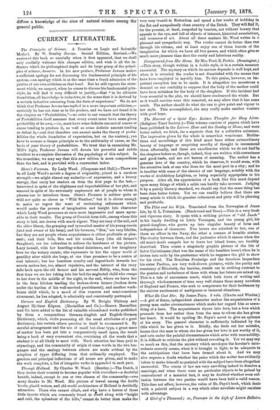CURRENT LITERATURE.
The Principles of Science. A Treatise on Logic and Scientific Methol. By W. Stanley Jevons. Second Edition, Revised.—We 'reviewed this book so carefully when it first appeared, that we shall only cordially welcome this cheaper edition, and wish it all the in- &mace which its philosophical depth and its large grasp of the princi- ples of science, deserve. In his new preface, Professor Jevons makes a sufficient apology for not discussing the fundamental principle of his system,—an apology which is at the same time a frank admission of the justice of our own criticism on that head. But he still repeats the state- ment which, we suspect, when he comes to discuss his fundamental prin- eiple, he will find it very difficult to justify,—that "in its ultimate 'foundation, all knowledge is inductive, in the sense that it is derived by a certain inductive reasoning from the facts of experience." We do not -think that Professor Jevons has replied to a more important criticism,— certainly he has not done so in the preface, and we have not found it in -the chapter on "Probabilities,"—we refer to our remark that the theory of Probabilities itself assumes that every event must have some given probability of its own,—i.e., must have some definite amount of source or cause tending to produce it, as well as some definite amount tending .to defeat it,—and that therefore you cannot make the theory of proba- bilities the whole foundation of expectation, but on the contrary, you have to assume a deeper principle as to the uniformity of cause, as the basis of your theory of probabilities. We trust that in examining Mr. 'Mill's logic, Professor Jevons will devote his powerful and subtle 'intellect to a complete discussion of the psychology of this subject. In the meantime, we may say that this new edition is more compendious -than the last, and is provided with a convenient index.


































 Previous page
Previous page